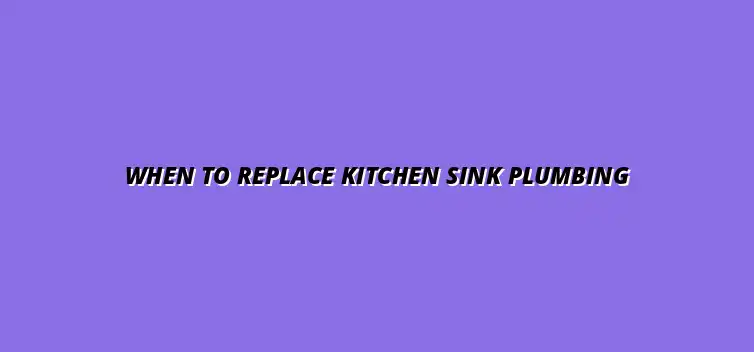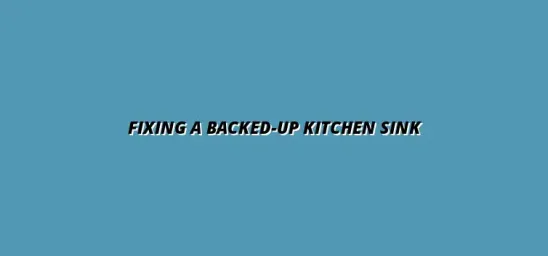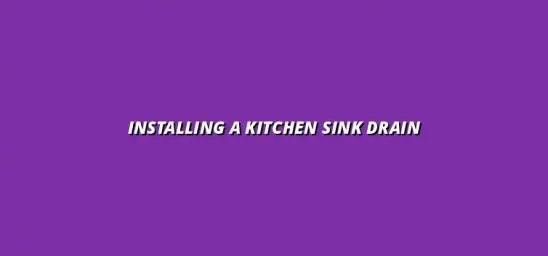
When to Replace Kitchen Sink Plumbing
Recognizing the Need for Kitchen Sink Plumbing Replacement
Every home has a vital element that often goes unnoticed until things go wrong — the plumbing system. In the kitchen, this is especially critical as it directly impacts how we cook, clean, and manage waste. To ensure everything flows smoothly, it’s essential to recognize when the time has come for kitchen sink plumbing replacement.
Understanding the signs of plumbing issues can save you time, money, and a lot of headaches down the line. I’ve learned that being proactive about plumbing can prevent minor annoyances from escalating into major problems. Whether you’re dealing with clogs or leaks, knowing when to replace your plumbing is key to maintaining a functional kitchen. For example, learning how to unclog your sink with a plunger can be a helpful first step.
Understanding the Importance of Kitchen Sink Plumbing
The Role of Plumbing in Kitchen Functionality
The plumbing system is the backbone of any kitchen. It allows water to flow for cooking, cleaning, and waste disposal, making it indispensable for daily tasks. Without a properly functioning plumbing system, even the simplest kitchen activities can become quite frustrating!
Not only does plumbing facilitate convenience, but it also plays a role in ensuring hygiene. Proper drainage and water supply are vital for keeping your kitchen clean and free from unsanitary conditions. In short, a well-functioning plumbing system is essential for a healthy home environment.
Consequences of Neglected Plumbing Issues
Ignoring plumbing problems can lead to serious consequences that can affect both your kitchen’s functionality and your home’s safety. For instance, persistent leaks can cause water damage to cabinets and flooring. This damage often requires expensive repairs that could have been avoided with timely plumbing replacements!
Additionally, neglected plumbing can lead to mold growth, which poses health risks to those living in the home. It’s important to recognize that small issues can quickly escalate into larger, more costly problems if left unaddressed. Knowing how to repairing a leaky kitchen sink can help prevent these issues from arising.
Common Signs Indicating Plumbing Replacement is Necessary
Frequent Clogs and Slow Drainage
If you find that your kitchen sink is frequently clogged or draining slowly, it could be a sign of deeper plumbing issues. While it’s normal to experience an occasional clog, frequent occurrences can point to more serious blockages in the pipes. These persistent problems can disrupt your daily activities and may indicate that it's time for a replacement.
To identify the severity, consider how often you’re having to clear the drain. If it’s becoming a regular chore, it’s worth investigating your plumbing system further! Addressing a clogged kitchen sink promptly is crucial.
Unpleasant Odors and Their Implications
Have you noticed any strange smells coming from your sink? Unpleasant odors can stem from food debris or stagnant water trapped in the pipes. A persistent smell may signal that there's a serious blockage or even a leak in your plumbing.
- Foul odors can indicate bacteria growth.
- They may signal stagnant water or trapped debris.
- Addressing the source is crucial for a healthy kitchen environment.
Water Leakage and Its Dangers
Water leakage is one of the most obvious signs that plumbing needs attention. If you see water pooling under the sink or notice wet spots on the walls, it’s time to take action! Leaks not only waste water but can also lead to structural damage and mold growth. Learning how to fix a leaky faucet is a good preventative measure.
Be vigilant about any signs of leaks. Catching them early can save you from extensive repairs and help you maintain a safe kitchen space!
Visible Rust and Corrosion on Pipes
Over time, pipes can develop rust and corrosion, especially if they are made from older materials. Visible rust is a clear sign that your plumbing may be nearing the end of its life. If you see any corrosion, it’s essential to consider replacing those pipes to prevent further damage.
- Rust can weaken the pipes, leading to potential leaks.
- Corrosion can affect water quality.
- Consider modern materials that resist corrosion better.
Noise from Pipes: What It Means
Are your pipes making strange noises like banging or gurgling? Noisy pipes can indicate air trapped in the system or problems with water flow. Such sounds are often signs that your plumbing requires evaluation. This could be related to issues with your gas water heater.
Pay attention to these noises, as they can provide clues about underlying issues. If the sounds persist, seeking a professional assessment can help determine if replacement is needed!
Evaluating Your Kitchen Sink Plumbing System
Key Components of Kitchen Sink Plumbing
Understanding the components of your kitchen sink plumbing can help you diagnose issues more effectively. Key parts include the sink itself, pipes, traps, and valves. Each component plays a crucial role in the overall function of your plumbing system.
- Sink: The main basin where you wash dishes and prepare food.
- Pipes: Transport water to and from the sink.
- Trap: Prevents sewer gases from entering your kitchen.
- Valves: Control the flow of water.
How Age Affects Plumbing Integrity
The age of your plumbing system can significantly affect its integrity. Older pipes, especially those made from materials like galvanized steel or lead, are more prone to damage and leaks. If your plumbing system is over 20 years old, it’s wise to consider a thorough evaluation. Regularly checking for signs your plumbing needs attention can be beneficial.
By understanding the age of your plumbing, you can make informed decisions about replacements and upgrades. Don’t wait until problems arise — being proactive can save you time and money!
DIY Assessments for Kitchen Sink Plumbing Issues
Simple Tests to Identify Problems
Before calling a plumber, there are simple DIY tests you can perform to assess your plumbing. For instance, you can check for leaks by wrapping a paper towel around exposed pipes and monitoring for moisture. Additionally, running water and observing the drainage speed can help identify clogs.
- Look for signs of water damage around the sink area.
- Listen for strange noises when running water.
- Check for rust or corrosion on visible pipes.
When to Seek Professional Help
While DIY assessments can be helpful, there are times when seeking professional help is necessary. If you notice persistent leaks, severe clogs, or rust in the pipes, it’s time to call in an expert. Professionals have the tools and knowledge to diagnose and resolve complex plumbing issues safely. For example, a plumber in your area, such as a plumber in Billesley, Birmingham, can provide assistance.
Don’t hesitate to reach out for help when needed! Addressing plumbing issues quickly can prevent more significant problems down the line.
Financial Implications of Plumbing Repairs and Replacements
Cost Analysis: Repairing vs. Replacing
When it comes to plumbing, you often face a choice between repairing and replacing. Repairs can be less expensive upfront, but they may not address underlying issues. On the other hand, replacements can be a larger investment but often save money in the long run by reducing future repair costs.
- Assess the extent of the damage.
- Consider the age of the plumbing system.
- Evaluate your budget for immediate and future costs.
Long-Term Savings from Replacing Old Plumbing
Investing in new plumbing can lead to significant long-term savings. Modern plumbing materials often come with warranties and require less maintenance, which can save you money over time. Plus, new plumbing systems can improve water efficiency, reducing your utility bills!
In summary, recognizing the need for kitchen sink plumbing replacement is crucial for maintaining a functional kitchen. By being aware of the signs and understanding the financial implications, you can make informed decisions that benefit your home in the long run.
Addressing Common Questions About Kitchen Sink Plumbing Replacement
What Are the Most Common Causes for Plumbing Replacement?
Understanding the causes of plumbing issues can help you take proactive measures. Some common causes for kitchen sink plumbing replacement include outdated materials, wear and tear from age, and severe clogs. Environmental factors, such as exposure to harsh chemicals, can also contribute to the degradation of plumbing systems.
Here's a list of the most frequent causes of kitchen sink plumbing problems:
- Corrosion from aging pipes
- Frequent and severe clogs
- Improper installation of plumbing fixtures
- Damage from tree roots or soil movement
- Wear and tear from constant use
How Often Should Kitchen Sink Plumbing Be Inspected?
Regular inspections are crucial to maintaining a healthy plumbing system. It’s generally recommended to have your kitchen sink plumbing checked at least once a year. However, if your plumbing is older or you've noticed problems, more frequent inspections may be necessary.
Consider the following factors when deciding on inspection frequency:
- The age of your plumbing system
- History of plumbing issues
- Recent renovations or changes to your kitchen
- Seasonal changes that may affect plumbing, like freezing temperatures
Can Minor Issues Be Fixed Without Full Replacement?
Yes, many minor plumbing issues can be resolved without the need for a complete replacement. Simple fixes such as tightening loose connections, clearing minor clogs, or replacing small sections of pipe can save you time and money. However, if you notice recurring problems, it may indicate a larger issue that requires replacement.
Here are a few common minor issues that can often be fixed:
- Clogged drains (which can sometimes be cleared with a plunger or drain snake)
- Leaky faucets (often due to worn-out washers or seals)
- Slow drainage (which can usually be improved with cleaning solutions)
Planning for a Kitchen Sink Plumbing Replacement
Choosing the Right Materials for Your New Plumbing
Choosing the right materials is essential for the durability and efficiency of your new plumbing. Modern plumbing materials, such as PVC, PEX, and copper, each have their unique benefits and drawbacks. It’s important to consider factors like cost, installation, and durability when making your selection.
Here are some common materials for kitchen plumbing:
- PVC: Affordable and easy to install, great for drainage.
- PEX: Flexible and resistant to corrosion, ideal for residential plumbing.
- Copper: Durable and long-lasting but can be more expensive.
Benefits of Modern Plumbing Materials
Modern plumbing materials have come a long way, offering several advantages over older options. For instance, materials like PEX and PVC are lighter, easier to install, and often more resistant to corrosion and leaks. They can provide a longer lifespan compared to traditional copper pipes.
Some benefits include:
- Enhanced durability and resistance to rust
- Lower risk of leaks and clogs
- Greater flexibility during installation
Environmentally Friendly Options for Kitchen Plumbing
If you're concerned about your environmental footprint, there are eco-friendly plumbing materials available. Options like recycled copper or PVC pipes with low environmental impact are excellent choices. Additionally, water-saving fixtures can help reduce your water usage in the kitchen.
Consider these environmentally friendly plumbing solutions:
- Low-flow faucets and fixtures
- Water-efficient appliances
- Recycled materials for pipes and fittings
Steps to Follow During the Replacement Process
Planning and preparation are key for a successful plumbing replacement. First, you must clear the area around the kitchen sink, removing any items that could obstruct the process. Next, ensure you have all necessary tools and materials ready to streamline the work.
Here are the steps to follow:
- Turn off the water supply to the kitchen sink.
- Disconnect the old plumbing components.
- Install the new plumbing system, ensuring proper connections.
- Test for leaks and ensure everything is functioning properly.
Hiring a Qualified Plumber: What to Look For
Finding the right plumber is crucial to ensuring your kitchen sink plumbing replacement is done correctly. Look for someone who is licensed, insured, and has good reviews from previous clients. It’s also a good idea to ask about their experience with similar projects.
Consider these factors when hiring a plumber:
- Experience with kitchen plumbing
- Customer feedback and ratings
- Availability and response time
- Transparent pricing and quotes
Maintaining Your New Kitchen Sink Plumbing
Once your kitchen sink plumbing is replaced, regular maintenance is key to keeping it in good condition. Simple practices, such as periodic cleaning of drains and inspecting for leaks, can help extend the life of your plumbing. Adopting a maintenance routine can save you from costly repairs in the future!
Here are some best practices for preventative maintenance:
- Avoid pouring grease or food scraps down the sink.
- Use drain strainers to catch debris.
- Regularly check for leaks under the sink.
Signs Your New Plumbing May Need Attention
Even with new plumbing, it’s essential to stay vigilant for any warning signs that something might be wrong. Unusual noises, slow drainage, or persistent odors can all indicate potential issues. If you notice any of these signs, it might be time to reach out for professional help.
Look out for these key indicators:
- Gurgling sounds coming from drains
- Unexplained dampness under the sink
- Sudden spikes in your water bill
Final Thoughts on Kitchen Sink Plumbing Replacement
Recap of Key Signs and Solutions
In summary, recognizing the signs that your kitchen sink plumbing needs replacement can help you avoid bigger problems down the line. From frequent clogs to visible rust, being proactive is essential. You have options, from repairing minor issues to fully replacing the system with modern materials.
Remember to consider your plumbing's age and condition when troubleshooting problems. Taking action sooner rather than later will save you time and money!
Encouragement to Prioritize Plumbing Health
Your plumbing system is a vital part of your kitchen, and maintaining its health should be a priority. Regular inspections, timely repairs, and knowledge about when to replace can help ensure your kitchen functions smoothly. Don't let plumbing issues disrupt your daily life!
Let’s keep your kitchen plumbing in top shape!
Call to Action: Schedule Your Plumbing Inspection Today
If you suspect your kitchen sink plumbing needs attention, don’t hesitate! Schedule your plumbing inspection today. Taking that first step can save you from larger repairs and keep your kitchen running efficiently.
Reach out to a qualified plumber to get started!





Fixing a Backed-Up Kitchen Sink
Prepare Your Plumbing for Weather
Installing a Kitchen Sink Drain
When to Replace Plumbing Fixtures
Fixing a Jammed Garbage Disposal